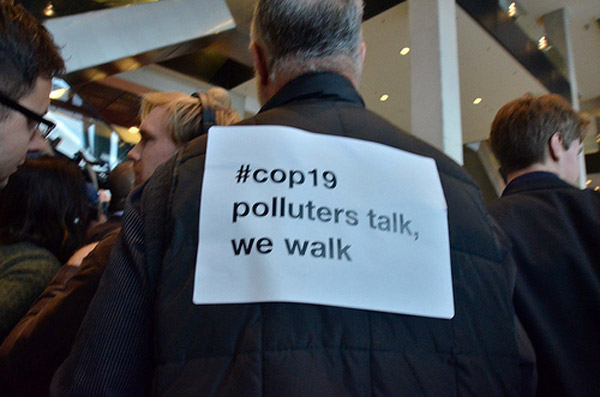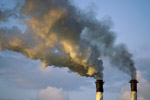Australia, Japan and Poland blamed for sabotaging UN Climate Summit talks.
Thirteen citizen groups—including Oxfam, Greenpeace, and WWF—have walked out of ongoing climate talks in Warsaw to protest what they view as a lack of ambition and long-stalled progress on combating global climate change. Nearly 200 governments are currently meeting in Warsaw, Poland at the the 19th Conference of the Parties (COP) for the UN Framework Convention on Climate Change (UNFCCC), which is meant to prepare the way for a new agreement in 2015.
“Enough is enough,” the groups wrote in a statement as some 800 members from conservation, youth, trade and poverty groups walked out. “The Warsaw Climate Conference, which should have been an important step in the just transition to a sustainable future, is on track to deliver virtually nothing. In fact, the actions of many rich countries here in Warsaw are directly undermining the UNFCCC itself, which is an important multilateral process that must succeed if we are to fix the global climate crisis.”
The groups largely blamed rich countries for the problems at Warsaw, which they say “have come with nothing to offer,” leveling particular scorn on Japan, Australia, and host nation Poland.
“When Japan announced that it was following Canada and backtracking on emission cut commitments previously made, and Australia gave multiple signals that it was utterly unwilling to take the UN climate process seriously, the integrity of the talks was further jeopardized,” the groups wrote.

NGO members walking out of UN Climate Summit in Warsaw. Photo by: © Nitin Sethi.
Canada has been viewed as an obstructor at international climate change meetings for years, but Japan surprised many with its announcement that instead of making good on its pledge to cuts emissions by 25 percent based on 1990 levels, it was actually going to allow emissions to rise over 3 percent from the same baseline (or as Japan phrased it a 3.8 percent cut based 2005 emissions).
Meanwhile, the new government in Australia, headed by Prime Minister Tony Abbott, has made waves at the climate talks for pulling back on previous commitments and thumbing their noses at already-established programs. In a sign of how far things have devolved in Warsaw, Australian delegates were harshly criticized yesterday for what was viewed as offensive behavior during closed negotiations with G77 nations and China, including “giggling” during proceedings, wearing T-shirts, and objecting to everything in draft texts.
“This is a serious issue. We are talking about life and death, people are dying from Typhoon Haiyan, we’ve got people on hunger strike here. You don’t trivialize these issues,” Saleemul Huq, a scientific adviser to the developing countries, told Renew Economy.
Australia has defended its delegates’ behavior. However, when progress was not forthcoming during the meeting the G77 nations and China walked out at 4 AM.
The meeting in Warsaw opened just days after Typhoon Haiyan—the most intense tropical storm to ever make landfall—swept over the Philippines, killing at least 4,000 people. Filipino delegate, Naderev ‘Yeb’ Saño, made an impassioned speech on the first day of the Summit and pledged to refrain from eating “until a meaningful outcome is in sight.” Scientists expect climate change to increase the intensity of tropical storms as warmer surface waters lead to higher wind speeds and more precipitation. In addition, rising sea levels are increasing storm surges.
“What my country is going through as a result of this extreme climate event is madness, the climate crisis is madness,” Saño said. “We can stop this madness right here in Warsaw.”
The citizen groups also poured criticism on host nation, Poland, for scheduling a coal summit at the same time as climate talks and allowing large polluting companies to sponsor the UN talks. Often seen as holding the EU back from greater emissions cuts, Poland produces 85-90 percent of its energy from coal power, the most carbon-intensive fuel source.
Hoda Baraka, Global Communications Coordinator with 350.org, which also walked out today, told the RTCC, that “it’s safe to say the fossil fuel industry could very well be considered the hosts [of the Warsaw meeting].”

Poland is home to Europe’s largest coal-fired power plant in Bełchatów. Photo by: Stasisław/Public Domain.
In another move the inspired criticism and head-scratching, Poland’s Prime Minister, Donald Tusk, fired the country’s Environment Minister, Marcin Korolec, yesterday in an apparent bid to speed up shale gas exploitation in the country. As Environment Minister, Korolec, was presiding over the UN meeting when the new came.
“This is nuts. Changing the minister leading the climate negotiations after a race to the bottom by parties of the convention shows Prime Minister Tusk is not sincere about the need for an ambitious climate deal,” said Maciej Muskat, the director of Greenpeace Poland.
Korolec will be allowed to finish presiding over the UN Summit, but then will be replaced with Poland’s former deputy finance minister, Maciej Grabowski.
“The Polish government has done its best to turn these talks into a showcase for the coal industry. Along with backsliding by Japan, Australia and Canada, and the lack of meaningful leadership from other countries, governments here have delivered a slap in the face to those suffering as a result of dangerous climate change,” said Kumi Naidoo, director of Greenpeace International and a veteran activist against apartheid in South Africa.
Nations worldwide have committed to keeping global temperatures from rising more than 2 degrees Celsius above pre-industrial levels, but experts says pledges for cutting emissions remain much too small while promised funding has yet to show up. Still, while many citizens groups have left the building, a few have remained behind hoping to see an agreement squeak by.
The exiting groups say they will be back next year in Lima, Peru, where they they intend to “hold our governments accountable to the vision of a sustainable and just future.”
While the UN Climate Summits have long been easy targets for critics—who note their often glacial pace and diplomatic drama—Warsaw appears particularly troubled. This is the first time civilian groups have staged such a large-scale walkout and the host country has come under such relentless and harsh criticism. Still, in the past these talks often seemed doomed up to the very end when an agreement is released.

Sunset in Madagascar. Photo by: Rhett A. Butler.
Related articles
The emissions gap and the forest contribution (commentary)

(11/20/2013) Shortly before the Warsaw climate talks, the United Nations Environmental Programme (UNEP) released its Emissions Gap report, highlighting the growing gap between the emissions reductions that are needed to stay below 2 degrees and the trajectory the world is on at the moment. The report clearly identifies forests as one of the most important options to reduce emissions which can be delivered in the short term. While parties urgently need to start phasing out fossil fuels and stop emissions from fossil fuels no later than 2050, protecting forests now can help significantly to keep a realistic chance of staying below 2 degrees.
UN talks tough to global coal industry

(11/19/2013) Yesterday, at the International Coal and Climate Summit—just a couple miles from the ongoing UN Climate Summit—Christiana Figueres delivered a speech unlike anything ever heard at a coal industry meeting before. Figueres, the Executive Director of the UN Framework Convention on Climate Change (UNFCCC), took time off from wrangling world leaders and officials toward a climate agreement to talk tough to an industry currently worth around $3 trillion.
Carbon emissions set to hit new record high in 2013

(11/19/2013) The amount of carbon dioxide emitted into the atmosphere in 2013 is expected to hit a new high of 36 billion tonnes, according to a Carbon Budget released today by the Global Carbon Project (GCP). This is a 2.1 percent rise from 2012 based on data from the same group. ‘We have exhausted about 70 per cent of the cumulative emissions that keep global climate change likely below two degrees,’ said GCP member, Pierre Friedlingstein, with the University of Exeter. ‘In terms of CO2 emissions, we are following the highest climate change scenario of the Intergovernmental Panel on Climate Change released in September.’
60,000 protest in Australia to keep carbon price
(11/18/2013) Around 60,000 Australians marched yesterday across the country calling on their government not to go backwards on climate action, according to organizers. Australia has taken a sudden U-turn on climate policy with the election of Prime Minister Tony Abbott in September, including legislation to end its carbon pricing, cutting funding to renewable energies, and obstructing progress at the ongoing UN Climate Summit in Warsaw.
Japan pledges to raise carbon emissions, instead of cutting them
(11/18/2013) In 2009, Japan pledged to cut its carbon emissions by 25 percent based on 1990 levels within 11 years. Four years later—including a nuclear meltdown at Fukushima—and Japan has reset its goal with a new target to cut emissions by 3.8 percent based on 2005 levels at the UN Climate Summit in Warsaw, Poland. But, the new target, which received widespread condemnation when announced on Friday, actually results in a 3.1 percent rise in emissions when viewed from the widely-accepted 1990 baseline.
World’s most vulnerable nation to climate change turns to coal power

(11/18/2013) In October, a global risks analysis company, Maplecroft, named Bangladesh the world’s most vulnerable nation to climate change by 2050. The designation came as little surprise, since Bangladesh’s government and experts have been warning for years of climatic impacts, including rising sea levels, extreme weather, and millions of refugees. However, despite these very public warnings, in recent years the same government has made a sudden turn toward coal power—the most carbon intensive fuel source—with a master plan of installing 15,000 megawatts (MW) of coal energy by 2030, which could potentially increase the country’s current carbon dioxide emissions by 160 percent.
Is Australia becoming the new Canada in terms of climate inaction?
(11/14/2013) For many concerned about climate change, Australia has suddenly become the new Canada. With the election of Tony Abbott as Prime Minister in September, the land down under has taken a sudden U-turn on climate policy, including pushing to end its fledgling carbon emissions program which was only implemented in 2012 and cutting funding for renewable energy. These move come at a time when Australia has just undergone its warmest 12 months on record and suffered from record bushfires.
(11/13/2013) In 2011, the top 11 richest carbon emitters spent an estimated $74 billion on fossil fuel subsidies, or seven times the amount spent on fast-track climate financing to developing nations, according to a recent report by the Overseas Development Institute. Worldwide, nations spent over half a trillion dollars on fossil fuel subsidies in 2011 according to the International Energy Agency (IEA).













